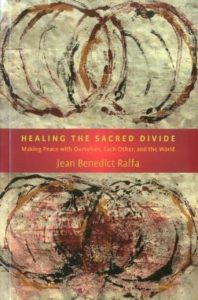
Living in a Culture That’s Lost Its Heart
“To learn how to fully live Eros makes a major contribution to the world around me, because this is a culture that’s lost its heart;
 SBD: Do you view writing itself as a kind of spiritual practice?
SBD: Do you view writing itself as a kind of spiritual practice? SBD: Has your experience in writing The Soul’s Twins been different from your experiences with your other books, or has it been much the same?
SBD: Has your experience in writing The Soul’s Twins been different from your experiences with your other books, or has it been much the same?
“To learn how to fully live Eros makes a major contribution to the world around me, because this is a culture that’s lost its heart;
“. . . when our left and right brain work in harmony, we begin to access our deeper Self and feel its guidance and support.

Those of us raised as Christians know this holiday is about a lot more than rushing about, partying and shopping, and many of us enjoy warm memories and nostalgic feelings this time of year. But why are the moments of love, joy and peace so difficult to find during the holiday season? Where do the feelings of exhaustion, anxiety, disappointment and depression come from? Why do we keep missing the point of Christmas? How can we recapture it?


Website design and development by Chad Lieberman
11 Responses
Just wonderful, Jeannie. Look forward to reading.
Sent from my iPhone
>
Thank you, Diane. And I look forward to reading your new book. When do you expect it to come out?
Reblogged this on lampmagician.
As always, thank you!
As always you are very Appreciated ❤❤
Do you still have that first book, the one with hieroglyphics that tells your story? Fascinating, where did you write, in your room? Love the interview! Jimmy B
Sent from my iPad
>
Hahahaha. I’m sure it did look like hieroglyphics! No, I remember showing it to Mama when she woke up from her nap (she was working nights so she could stay home with me during the day) but I have no recollection of ever seeing it again after that. We were living in Tallahassee at the time and you must have been at school. I can’t remember where I “wrote” it, or where I got the paper from. I just remember the experience, especially the drawing part. I was very proud of it until I came to the third page—eating breakfast. That’s when I gave up. I really wanted to tell my story but the idea of trying to draw a table, chair, me sitting in it, a bowl on the table with cereal in it, and a spoon was daunting. Especially the cereal!. But it felt like a book and I think it made Mama smile, and I loved that.
Dear Jeannie lovely to read this thank you! – your words as always are an affirmation of living life as authentically as possible, warts wounds wonder and all! The inner world has so much to offer if we pay heed….
Hi Susan. It surely does. For some reason, it seems to have always been my primary ‘default setting,’ my happy place. Perhaps because I had a lot of alone time from a very early age, I developed a rich inner life which often felt more comfortable and interesting than the outer world. Maybe I was born an introvert, or maybe circumstances turned me into one. But whatever the reason, I’m well suited to the solitary life of a writer and the inner search for self-realization. I know paying heed to the inner life doesn’t come as naturally to others as it does to me, but I also know it’s well worth the effort.
Terrific interview. You have plenty to write about now. I look forward to your new book, as I’m sure many others do. Now back to your writing cave. My writing and workshop planning cave is populated by Monarch butterflies and flowers, so they keep it bright in here.
Thanks, Elaine. I do still have plenty to write about, thank goodness. We have butterflies and flowers, but not Monarchs! I’d love to see them in person. Enjoy your bright cave! Love, Jeanie